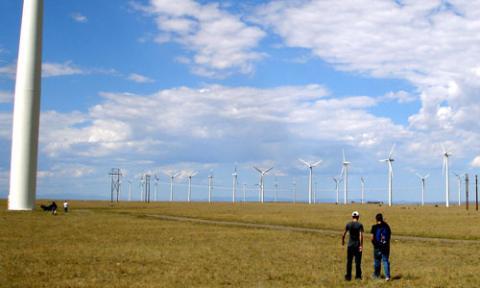
Section Branding
Header Content
More green energy projects could be on the horizon for Georgia. Here's why
Primary Content
GPB's Peter Biello talks with Katie Southworth of CEBA about a new agreement with Georgia Power.

The Hyundai megaplant in Bryan County recently raised eyebrows when it purchased electricity from a solar farm in Texas. Why not buy clean power generated in Georgia? Corporations that want locally sourced energy might be getting some help doing just that. A new agreement between the advocacy organization, the Clean Energy Buyers Association (CEBA) and Georgia Power would help bring more homegrown green energy to market. Katie Southworth is the deputy director of market and policy innovation for the southeast at CEBA. She spoke with GPB's Peter Biello.
TRANSCRIPT
Peter Biello This most recent agreement essentially works as a handshake between your organization and Georgia Power, saying you're going to work together to develop a carbon-free energy program for larger consumers. How will that agreement work?
Katie Southworth So we're seeing energy demand rising, and in large part it's because of our members, the Clean Energy Buyers Association businesses, industrial and commercial customers. What we saw in the last IRP was that the utility, Georgia Power, was planning to build all of the generation to meet this growing need themselves, and customers want to be part of the solution.
Peter Biello And the integrated resource plan, that's the IRP you're referring to, is basically just a plan for the large utility to provide electricity and to keep it reliable in the long term.
Katie Southworth That's correct, Peter. So, an integrated resource plan essentially is the utilities' plan [for] investments they're going to make over the next 10, 15, 20 years to meet the needs of customers. So, that plan determines not only how much generation is needed, but what quality of generation is, right? So we're talking about clean—is it going to be natural gas, nuclear, all of the different generation resource types? Customers are here and ready and willing to bring their own capital investment ideas and clean energy expertise that they have from operating across the U.S. and some of them worldwide. They're wanting to bring it to Georgia, work with Georgia Power to develop this program and introduce it into next year's plan.
Peter Biello So how would a large consumer under this agreement incorporate large green energy projects?
Katie Southworth Currently, customers have to work through Georgia Power's existing renewable subscription program, where Georgia Power solicits, develops and comes up with agreements with the renewable generation developers. As we've proposed this program, customers can have a three-way agreement where they're working with Georgia Power and a developer to bring that project to Georgia and do it in a faster, cleaner, quicker way. Customers can identify who they want to work with, develop the project with the characteristics that they need, and then do what's called a "sleeved" power purchase agreement, where it goes onto the Georgia Power system and Georgia Power is party to the transaction as well as the customer. So the customer has skin in the game, the developer has more assurance because they've got a utility and a customer committing to supporting the project, and so it's a win-win-win across the board.
Peter Biello So the headline I'm imagining here is that corporations in Georgia are investing in Georgia to create clean energy that they themselves can use.
Katie Southworth That's it.
Peter Biello Would a corporation have exclusive use over the energy that they have helped pay to create?
Katie Southworth So the program does not envision wheeling power point-to-point from generation to the customer that's going to end user, but rather the energy will contribute to the Georgia Power system, right? So it would decarbonize the Georgia power system as a whole, and the customer would receive credit for the renewable energy and environmental attributes, such as greenhouse gas reductions that come from the generation source. So it will contribute to the power needs of the entire system but those renewable and emissions environmental attributes would be credited to the customer.
Peter Biello Overall, what is your hope for the future of clean power consumption in Georgia?
Katie Southworth Short term, I'd like to see this program be workable for customers of all sizes, large industrial customers and our retail commercial members, too. We just want to see a successful program that has a lot of uptake and allows for flexibility, for customers to bring innovative solutions. So that's over the next five years. Over the longer term, my hope is that Georgia will evaluate the economic benefits and reliability benefits that the state could achieve through pursuing broader energy market reforms, including evaluating joining a competitive wholesale market.

